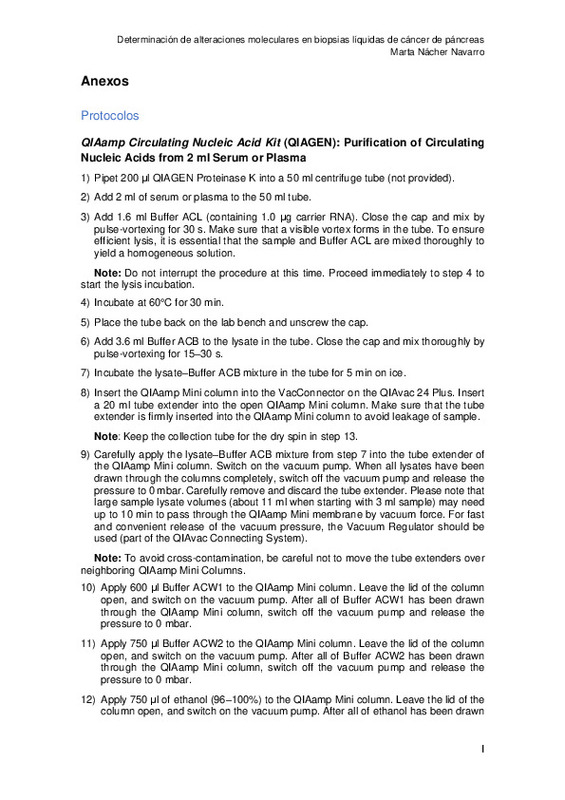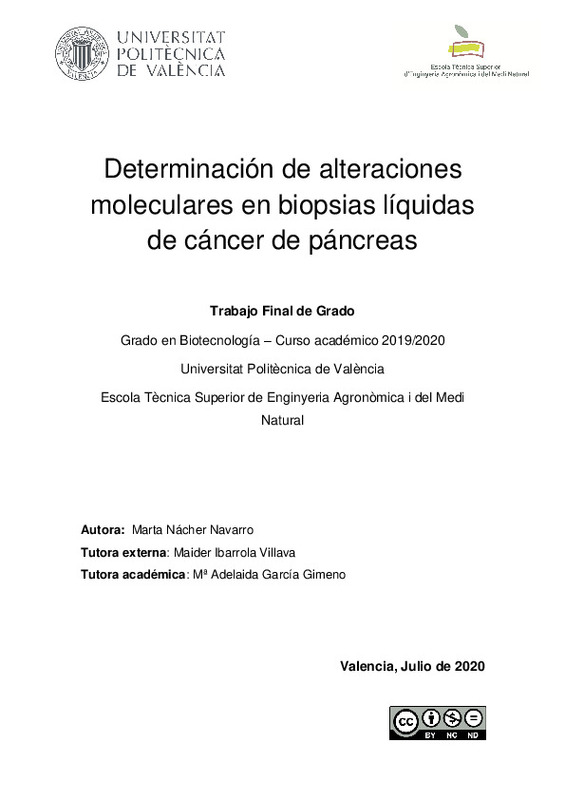|
Resumen:
|
[ES] El cáncer es una importante causa de muerte a nivel mundial. En concreto, el cáncer de páncreas es un tipo particularmente agresivo, con alta letalidad y difícil tratamiento. Esto se debe a que es detectado mayoritariamente ...[+]
[ES] El cáncer es una importante causa de muerte a nivel mundial. En concreto, el cáncer de páncreas es un tipo particularmente agresivo, con alta letalidad y difícil tratamiento. Esto se debe a que es detectado mayoritariamente en fases avanzadas de la enfermedad, suponiendo una acción terapéutica tardía.
Actualmente, la medicina de precisión cobra cada vez una mayor importancia en el manejo del cáncer, contribuyendo en su diagnóstico y seguimiento, y permitiendo ofrecer un tratamiento lo más adecuado y específico posible para el paciente, gracias al análisis molecular del tumor.
La biopsia líquida comprende fluidos corporales circulantes (sangre, orina¿) que pueden contener material genético liberado por el tumor, como el ADN tumoral circulante (ctDNA). Destaca por ser mínimamente invasiva y fácil de obtener, por lo que su uso para la caracterización molecular del tumor es de gran interés. Además, puede ser especialmente útil para monitorizar la enfermedad a tiempo real, detectar la enfermedad mínima residual, la aparición de recaídas y posibles resistencias al tratamiento.
Existe una gran variedad de métodos para caracterizar molecularmente al tumor entre los que destacan las plataformas de secuenciación de nueva generación o Next Generation Sequencing (NGS). Sin embargo, para detectar ctDNA, la técnica más sensible y específica es la PCR digital en gotas o droplet digital PCR (ddPCR).
En este trabajo se han descrito los genes más frecuentemente mutados en cáncer de páncreas: KRAS, TP53, SMAD4 y CDKN2A y se ha diseñado un panel de genes candidatos para el diagnóstico del cáncer de páncreas que serán caracterizados mediante NGS en muestras de biopsia líquida o tejido. Se ha observado que el oncogén KRAS es un biomarcador potencial importante por ser el gen más frecuentemente mutado en este tipo de cáncer y finalmente, se ha determinado que el 72,97% de los pacientes de cáncer de páncreas estudiados experimentalmente presentan mutaciones en la posición G12/G13 de KRAS.
[-]
[EN] Cancer is an important death cause at a global level. In particular, pancreatic cancer is an especially aggressive type, with high lethality and difficult treatment. This happens because it is mainly detected in ...[+]
[EN] Cancer is an important death cause at a global level. In particular, pancreatic cancer is an especially aggressive type, with high lethality and difficult treatment. This happens because it is mainly detected in advanced stages of the disease, entailing a late therapeutic action.
Nowadays, precision medicine is gaining higher importance in cancer¿s management, contributing in its diagnosis and follow-up, and allowing to offer a more adequate and specific treatment for the patient, thanks to the molecular analysis of the tumor.
Liquid biopsy comprises circulating bodily fluids (blood, urine¿) that may contain genetic material released by the tumor, like circulating tumoral DNA (ctDNA). It stands out for being minimally invasive and easy to obtain, therefore its use for tumor molecular characterisation is highly interesting. Moreover, it can be especially useful to monitor the disease at real time, detecting minimal residual disease, relapse apparition and possible resistances to the treatment.
There is a variety of methods to characterise the tumor molecularly and among them, Next Generation Sequencing platforms (NGS) can be highlighted. However, to detect ctDNA, the most sensitive and specific method is the droplet digital PCR (ddPCR).
In this work, the most frequently mutated genes in pancreatic cancer have been described: KRAS, TP53, SMAD4 and CDKN2A and a panel of candidate genes for pancreatic cancer diagnosis that will be characterised through NGS in liquid biopsy or tissue samples has been designed. It has been noted that the oncogene KRAS is an important potential biomarker since it is the most frequently mutated gene in this type of cancer and it has been experimentally determined that 72.97% of the studied pancreatic cancer patients display mutations in the G12/G13 position of KRAS.
[-]
|








